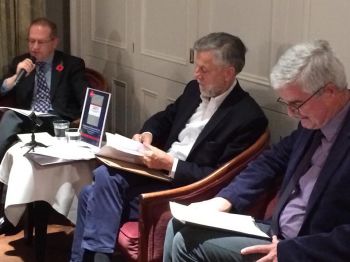Polish Embassy promotes Sussex scholar’s book on dealing with the communist past
By: Laura Arnold
Last updated: Thursday, 6 December 2018

Aleks Szczerbiak, Prof Andrzej Zybertowicz and journalist Jonathan Luxmoore
Promoting his recently published book at two events organised recently by the Polish Embassy in London, Sussex Professor of Politics Aleks Szczerbiak, who is of Polish origin himself, explained how the issue of dealing with the communist past has become one of the main causes of political divisions in contemporary Poland.
Prof Szczerbiak’s book Politicising the Communist Past: The Politics of Truth Revelation in Post-Communist Poland, published as part of Routledge’s prestigious British Association for Russian and East European Studies (BASEES) series, examines why disagreements about transitional justice, vetting officials and public authority figures for their links with the former communist security services - a process known as ‘lustration’ - and opening up these services’ extant files for public inspection, became one of the main causes of political divisions in post-communist Poland.
The well-attended and extremely lively book promotion events were hosted by: the famous Ognisko club in South Kensington, one of London’s oldest and most important Polish cultural centres, which today holds a wide range of high-profile educational events; and Glasgow University’s Centre for East European Studies, in association with the city’s General Sikorski Polish Club. Last week’s promotional events follow the success of Prof Szczerbiak’s book launch held in March at the Polish Embassy in London.
The two events attracted wide audiences that, in addition to representatives of large Polish communities in London and Glasgow, included journalists, policy-makers and academic specialists researching the post-communist states of Central and Eastern Europe.
Prof Szczerbiak argued that the issue was of crucial importance because: "It is impossible to make sense of today’s Polish political scene without understanding contemporary debates about the nature of the country’s communist past and disagreements about its contested transition to democracy."
Although it is a close ally of the current British government, Poland has been in the news recently following sharp disagreements between Warsaw and the EU political establishment and major European powers arising from the Polish government’s programme of radical reconstruction of the country’s state institutions including the judiciary, civil service and public broadcasting.
The Polish Ambassador to the UK, HE Prof Arkady Rzegocki, who attended the Ognisko promotional event, has described Prof Szczerbiak’s "fascinating and timely" book as a major contribution to debates trying to make sense of Poland’s contemporary political scene.
The book has been selected to be part of the Embassy’s ‘Polish Bookshelf’ project, a campaign to celebrate the 100th anniversary of Poland regaining independence, promoting selected books on Polish topics in libraries across the UK which features events with authors and public libraries receiving books as gifts.
At both events, Prof Szczerbiak was in conversation with Prof Andrzej Zybertowicz, a sociologist from the Mikołaj Kopernik University in Toruń in Poland specialising in the links between the former communist security services and post-communist elites. Prof Zybertowicz, who is an adviser on security issues to the current President of Poland Andrzej Duda, warmly praised Prof Szczerbiak’s "clear, detailed and extremely knowledgeable" book. Drawing analogies with the way that Poland benefited from consulting international experts and advisers when drawing up its anti-corruption reforms, he cited Prof Szczerbiak’s work as precisely the kind of expertise that Polish policy makers should be drawing upon when discussing how to deal with issues relating the country’s communist past.
Prof Szczerbiak commented: "I am extremely grateful to the Polish Embassy both for hosting my original book launch earlier this year and for these two follow-up events. I am delighted that my book has been so well received and generated such strong interest among academic specialists and policy-makers but also the UK’s one million-strong Polish community.
"Poland is a fascinating case of how post-communist states have dealt with their past because the lustration and file access issue keeps recurring in the country’s political debates. It does so because these processes are felt by some to be part of the 'unfinished business' of the country’s democratic transition and an important means of revealing the hidden mechanisms and informal elite networks which many politicians and commentators have argued distort the working of democracy in the post-communist state."